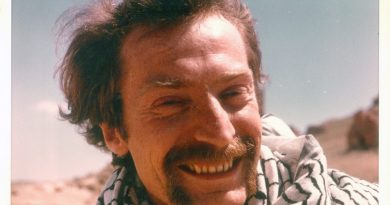Movie displays cooperation between Palestinians, Israeli activists
by: mrit agaiby
A Palestinian documentary, “Five Broken Cameras,” was screened by Al-Quds Club, a Palestine advocacy student club at AUC, and the Office of Residential Life last Wednesday.
The movie, which won a number of international awards, was actually filmed with five broken cameras over a period of six years in Palestine.
Bombs and bullets hit the cameras and every time they did, Emad Burnat, the cameraman, would also get injured.
“Healing is a challenge in life. It’s a victim sole obligation. By healing, you resist oppression. But when I’m hurt over and over again, I forget the wounds that rule my life,” said Burnat in one of the movie’s scenes.
“Forgotten wounds can’t be healed. So I film to heal. I know they may knock at my door at any moment. But I’ll just keep filming. It helps me confront life. And survive,” he added.
Burnat started documenting the life of his son, Gibreel, as he grew up in Bil’in, a small Palestinian village, where a big part of the land is occupied by Israeli settlements.
The movie showed scenes of Israelis occupying farmland in the village and handing it over to construction companies in order to establish houses for Israeli nationals.
Meanwhile in the movie, Burnat and his two best friends, brothers, and family, protested against the Israelis.
Despite their injuries, they did not give up and came up with more ways of defying the Israeli government, sometimes even with the help of Israeli activists.
Tear gas bombs broke the first camera in the movie during protests in Israel, in one of the scenes depicting Israeli brutality towards Palestinians.
The protesters were beaten up and arrested, even shot at with live ammunition.
“[The movie] catches the reality, [the scenes] are facts that are not edited. You could see the cameras’ break, and the footage is all real. This is only a small fraction of what happens in Palestine,” said Yasser Khaldi, the event’s organizor on behalf of Al-Quds Club.
Sally Bisharat, a student who watched the movie, said it portrayed the point of view of an ordinary Palestinian man and what happens to his family and world.
“In Egypt, a normal family leads a normal life that is fun and comfortable, whereas a normal Palestinian family witnesses something similar to what Emad Burnat’s family does,” explained Bisharat.
Khaldi chose this movie for its Oscar nomination and because it won the World Cinema Documentary Directing Award at the 2012 Sundance Film Festival, as well as the Audience Award and Jury Award at the 2012 International Documentary Film Festival Amsterdam.
The movie was edited and subtitled in English by an Israeli activist, Guy Davidi.



